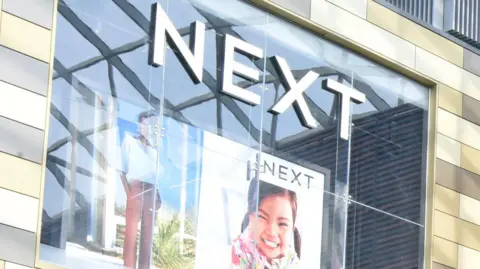Tax changes announced in the budget could make it “more difficult to enter the job market”, according to the boss of retail giant Next.
Lord Wolfson told the BBC that an increase in national insurance paid by businesses would hit the retail sector particularly hard and meant “the ax had fallen particularly hard” on entry-level jobs.
He called on the government to spread tax changes over time, rather than introducing them in April, otherwise jobs or working hours would have to be lost.
But a Treasury spokesperson said the budget measures were aimed at “wiping the slate clean” and providing stability for businesses.
In the October Budget, the Government increased the National Insurance (NI) rate paid by employers from April and also reduced the threshold at which employers start paying it from £9,100 to £5,000 .
Businesses also face an increase in the national living wage in April, twice the rate of inflation.
Lord Wolfson, who is a Conservative peer, said the changes would hit employers with large numbers of lower-paid or part-time workers hardest.
Next’s wage bill is expected to increase by £70m, and Lord Wolfson said this would result in a reduction in the number of hours worked by employees, either through fewer workers or fewer employees. hours per employee.
He called on the Government to lower the NI threshold over time, rather than following the few months’ notice employers were given in the October Budget.
He said that while the tax increase on a £60,000-a-year job was around 2%, the increase for a part-time worker earning a decent wage was around 6.5%.
“The ax has therefore fallen particularly hard on entry-level jobs benefiting from the national living wage, and this is where the pain will be felt the most.”
Lord Wolfson said this was not just a concern for retailers, but also a concern for the economy as a whole. Next received 13 applications for every Christmas vacancy this year, an increase of 50% on last year.
“I fear that it will be more and more difficult for people to access the job market,” he said.
“It is very difficult to imagine how such a significant increase in the cost of entry-level work could result in anything other than a reduction in the number of opportunities available.”
But a Treasury spokesperson said more than half of employers would see either a reduction or “no change” in their national insurance bills.
They added that they were “creating the conditions” for economic growth through measures such as capping the corporate tax rate and creating a National Wealth Fund.
The NI and minimum wage measures have sparked criticism from UK businesses, who say the changes run counter to the government’s aim of boosting economic growth.
Earlier this month, the British Chambers of Commerce says confidence has ‘collapsed’with more than half of businesses planning to raise prices over the next three months in the face of a “pressure cooker of rising costs and taxes”.
Official figures on Friday revealed that UK retail sales volumes fell by 0.3% in December, despite analysts’ expectations of a 0.4% rise, with the fall due to a ” “very bad month” for food sales, according to Hannah Finselbach, principal statistician at the Office for National Statistics.
She said food sales fell last month to their lowest level since 2013, but it was a “best month for clothing and homewares stores, where retailers have reported strong Christmas trading.”


Last year, Next was one of the signatories of the a letter from British retailers to Chancellor Rachel Reeves calling for a rethink of budgetary measures.
The letter said job losses on the high streets were “inevitable” and also warned that prices would rise and shops would close.
But in an interview with the BBC, The chancellor defended what she called “difficult decisions”, arguing that they were “right decisions in the national interest”.
Next made more than £1 billion in profits last year and is expected to repeat that this year. Meanwhile, other large retailers with large staff numbers – such as Tesco and Sainsbury’s – have also made bumper profits. Lord Wolfson acknowledges that they constitute the “broad shoulders” that the Chancellor says must bear the weight of the tax increases needed to rebuild public services.
“The government needed to raise taxes. I have nothing against lowering the threshold for NI in principle, but the speed with which it’s going to happen, the lack of consultation, that’s the problem. “
Lord Wolfson is also concerned about a new workers’ rights bill.
This promises to provide greater protection against unfair dismissals and “exploitative” zero-hours contracts, with employees able to apply for a guaranteed hours contract based on hours worked over a given period. But that could pose a problem for retailers.
“We are offering additional hours to staff in the run-up to Christmas. If legislation requires these hours to be contractually binding forever, we simply won’t be able to do it at all, it would be impossible.”
He offers some advice to the Chancellor in her efforts to boost business growth and confidence: Start in your own backyard.
“Over the past five years, the government has employed 100,000 additional civil servants.
“We cannot continue to spend more than 40% of GDP on the public sector. It has to become more efficient and if the government can commit to doing that – and deliver on it – then I think it will do more for public confidence. companies than anything else.





